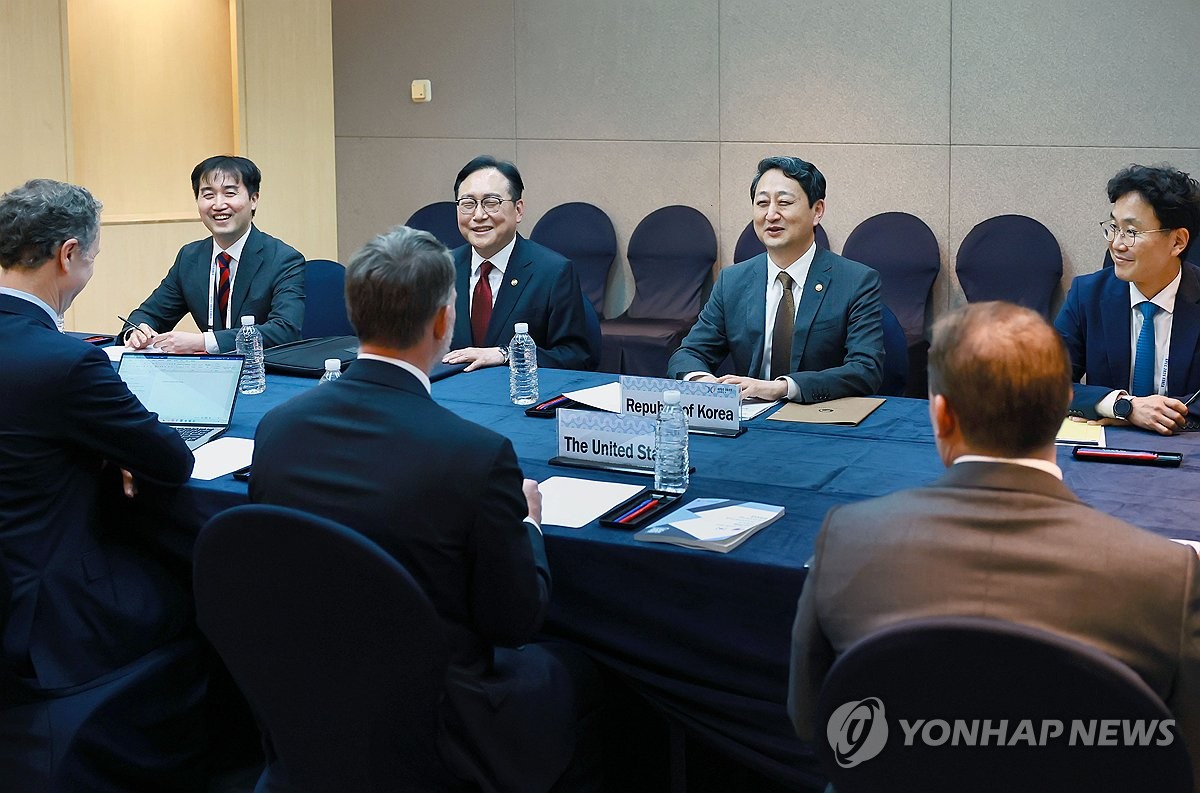- California Assembly OKs highest minimum wage in nation
- S. Korea unveils first graphic cigarette warnings
- US joins with South Korea, Japan in bid to deter North Korea
- LPGA golfer Chun In-gee finally back in action
- S. Korea won’t be top seed in final World Cup qualification round
- US men’s soccer misses 2nd straight Olympics
- US back on track in qualifying with 4-0 win over Guatemala
- High-intensity workout injuries spawn cottage industry
- CDC expands range of Zika mosquitoes into parts of Northeast
- Who knew? ‘The Walking Dead’ is helping families connect
S. Korea again requests exemption from all U.S. tariffs; 2nd round of technical talks to be held next week
South Korea has again asked the United States to exempt the country from all tariffs, Seoul’s Industry Minister Ahn Duk-geun said Friday, after meeting with U.S. Trade Representative Jamieson Greer on the sidelines of a trade ministers’ meeting of the Asia-Pacific Economic Cooperation (APEC) member economies.
In the meeting, the two sides agreed to hold their second round of technical discussions in Washington next week on six areas related to trade — trade imbalances, non-tariff measures, economic security, country of origin of products and commercial considerations — Ahn said.
Next week’s meeting is expected to be followed by additional high-level talks in mid-June, he added.
The high-level meeting held on South Korea’s southern island of Jeju comes about three weeks after their last gathering in Washington for high-level trade consultations, where the two sides agreed to pursue a “package” deal on U.S. tariffs and economic cooperation issues by July 8.
Greer was participating in the APEC Ministers Responsible for Trade meeting on Jeju, which wrapped up its two-day run on Friday.
Last month, Seoul and Washington agreed to focus their talks on four categories — tariff and non-tariff measures, economic security, investment cooperation and currency policies.
South Korea has been seeking to get a reduction or exemption from U.S. tariffs, including 25 percent reciprocal duties, which have been suspended for 90 days.
“In Friday’s meeting, we tried to raise awareness that South Korea has a bilateral free trade agreement (FTA) with the U.S., unlike some other countries, and have expanded trade and investment with the U.S. under the FTA,” Ahn told reporters in a press briefing.
“We also explained that U.S. tariffs on automobile and steel imports have a huge impact on trade relations between the two countries,” he added.
Ahn noted that South Korea’s capabilities in becoming a major cooperation partner to the U.S. in industrial sectors, such as semiconductors, energy and advanced technologies, stand out compared to other countries.
“Rather than approaching the negotiations in a narrow-minded manner of reducing South Korea’s trade surplus with the U.S. to get tariff cuts, we are working to build a more constructive and future-oriented relationship with Washington, where the two countries can create a stable trade environment and strengthen industrial cooperation,” he said.
On concerns over the current leadership vacuum in South Korea, the minister said Seoul is “doing its best” to meet the July 8 deadline, but also noted the possibility of a delay due to the domestic political situation.
South Korea is scheduled to hold a presidential election on June 3 following the impeachment of former President Yoon Suk Yeol due to his failed martial law bid.
“The U.S. understands we are not trying to unnecessarily delay our negotiations by using the domestic political situation as an excuse.”

Regarding next week’s technical discussions, Ahn said the U.S. has shown a big interest in digital trade, including Google Maps and cloud computing issues, Ahn said.
The shipbuilding cooperation and Seoul’s potential participation in the Alaska liquefied natural gas project, however, will not be covered in the talks, the minister said, noting the issues will be discussed separately.
Earlier in the day, Greer also met with executives of HD Hyundai Heavy Industries Co. in Jeju to discuss bilateral cooperation in shipbuilding.
Shipbuilding cooperation is one of the key agenda items of the Seoul-Washington trade negotiations amid the Trump administration’s push to rebuild America’s shipbuilding sector. South Korea is a global leader in the shipbuilding industry.
Last month, U.S. Secretary of the Navy John Phelan visited South Korea to tour HD Hyundai Heavy Industries’ Ulsan headquarters and Hanwha Ocean’s Geoje shipyard.
In an exclusive written interview with Yonhap News Agency following his trip, Phelan said the U.S. Navy welcomes further collaboration with South Korean shipyards as part of a broader effort to revitalize America’s maritime industrial base.
Meanwhile, on media reports the Alaskan government has invited South Korean trade officials to its sustainable energy conference kicking off on June 2 (local time), Ahn confirmed his ministry received such an invitation.
“We are still reviewing if we can attend the conference due to the timing,” he said, apparently conscious of the South Korean presidential election the following day.












